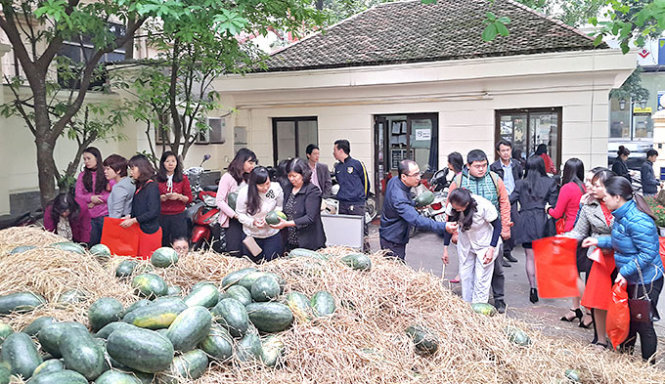The fact that the employees of the Ministry of Industry and Trade and other people who have rushed to help resell inventory watermelon from central Vietnam, at the end of the day, may not be helpful for all market participants, as projected to be.
In recent times, in some northern and central provinces and cities, including Hanoi, many people, including those working for the Ministry of Industry and Trade, and some organizations have began purchasing watermelon from farmers in the central region to resell them in their places.
On Thursday last week, the ministry brought home 19 metric tons of watermelons from the Tan Thanh border gate in the northern province of Lang Son, where up to 500 trucks carrying the fruits were waiting for their turn to cross the border to China for distribution.
They also repurchased the fruits from many watermelon trucks queuing hopelessly in long lines at the Tan Thanh border gate to sell to people at reasonable prices.
Around 800 such trucks flock to the border gate on a daily basis, whereas the Chinese side is only capable of receiving 300 vehicles a day, according to Nguyen Duong Thai, deputy head of the Vietnam Customs.
The organizers of those watermelon purchase campaigns have chosen to buy directly from farmers at prices three times higher than what traders offer, at VND1,000 per kilogram, and then transport the fruits to Hanoi and other neighboring localities for sale.
After being gathered at the venues rented at fair prices, or for free, the watermelons are carried by young volunteers to the end-consumers. For large orders, a number of transport firms, which join the campaigns, have offered very low, or even free, shipping services.
All these costs, including the rental and transport fees, have not been included in the retail prices which have been set at around VND5,000-6,000 per kilogram.
In addition, many organizations and individuals have purchased in bulk for use or giving to their employees, friends, and relatives.
Apart from helping farmers sell their watermelons faster, the move has also made consumers feel comfortable as they could buy the fruits at a cheaper price than what is available on the market or in supermarkets in the northern region, around VND15,000 per kilogram.
Philanthropy versus market mechanisms
Seen from the economic aspect, the recent move for the sake of philanthropy is not as effective as expected as a lot of intangible and tangible costs have not been included in the prices, according to the government website chinhphu.vn.
What is more, it is worth noticing that consumers cannot buy watermelon, onion, garlic, lychee or a certain type of agricultural product more often just because of philanthropic calls without considering their real demand.
Despite the support, the purchase price of agricultural products remains low, less than half the price the farmers wanted to sell and below the cost of production, Dr. Nguyen Dinh Anh, an expert in market mechanisms and pricing, told national broadcaster VTV in an interview on Tuesday.
The consumption of any kind of product, which in this case is watermelon, needs to follow the rules of the market for the production of goods and services.
"Do not produce something that we can do, but make something that the market needs. This is the ultimate principle of all market principles,” Dr. Anh said.
Moreover, the sale of any products and services without profit is not the solution, and cannot be considered a substitute for economic policies based on market mechanisms, according to chinhphu.vn.
It is a fact that many people are longing for a sustainable supply chain of goods, from the producer to distributors and consumers, with a minimal number of intermediaries.
In addition, there are many reasons for this situation, one of which is that there is no access for local farmers to sufficient and real-time market information, especially for agricultural produce heavily dependent on natural and seasonal factors and at higher risk of losses over the conditions of storage and transportation, Dr. Anh said.
What has also been questioned by experts for years is what is the real role of state agencies, like the Ministry of Industry and Trade and the Ministry of Agriculture and Rural Development, in providing market information and orientation for what should be produced, planted or raised in accordance with market mechanisms, and timely warnings for certain kinds of produce with low demand, according to chinhphu.vn.
Like us on Facebook or follow us on Twitter to get the latest news about Vietnam!


















































